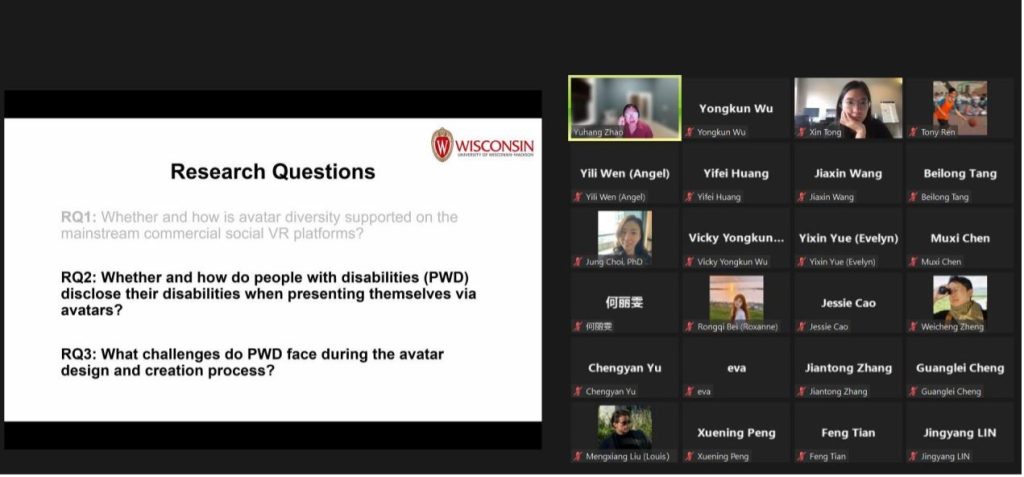This lecture by Professor Yuhang Zhao was a part of HRC’s Anthropocene XR Lab‘s Talk Series. Click here for upcoming events from the Lab.
Reported by Vicky Yongkun Wu, Class of 2026.
Social VR refers to VR platforms where people communicate and socialize in the form of avatars. With the advancement of technology, social VR is increasingly influencing the next generation. However, current VR technology mainly relies on realistic visual feedback to provide an immersive experience to sighted people. Most VR applications are not accessible to visually impaired people, preventing them from benefiting from this important class of emerging technology. Prof Yuhang Zhao’s talk focused on her research on social VR accessibility and inclusion.
Prof Yuhang Zhao is an Assistant Professor in the Computer Science Department at the University of Wisconsin-Madison. Her research interests include human-computer interaction, accessibility, and augmented and virtual reality. In this talk, she guided us to explore the enhancement of disability representation in social VR, the improvement of social VR techniques that are accessible to people with disabilities, and the incorporation of accessibility into mainstream VR applications.
In the first part of the presentation, Prof Zhao explored two research questions: whether/how people with disabilities (PWD) disclose their disabilities when presenting themselves via avatars and the challenges PWD face during the avatar design and creation process. To answer the questions, Prof Zhao’s research team has conducted semi-structured interviews with 19 participants with different disability types.
 According to the interview, Prof Zhao concluded that PWD use disability disclosure as strategies for self-presentation. Most importantly, PWD’s disclosure willingness is not binary; it is measured in a spectrum ranging from reflecting a physical self with all disabilities to presenting a self not defined by disability. One participant who accepted full disclosure “like [his] avatar to represent [him] as realistic as possible” using a cochlear implant. Another participant chose to partially reflect disabilities due to the fact that she “[has] had the hearing disability for a lot less time than the [blindness].” On the other end of the spectrum, a transgender participant expressed that he “[doesn’t] want [disability] to be the initial impression people have.”
According to the interview, Prof Zhao concluded that PWD use disability disclosure as strategies for self-presentation. Most importantly, PWD’s disclosure willingness is not binary; it is measured in a spectrum ranging from reflecting a physical self with all disabilities to presenting a self not defined by disability. One participant who accepted full disclosure “like [his] avatar to represent [him] as realistic as possible” using a cochlear implant. Another participant chose to partially reflect disabilities due to the fact that she “[has] had the hearing disability for a lot less time than the [blindness].” On the other end of the spectrum, a transgender participant expressed that he “[doesn’t] want [disability] to be the initial impression people have.”
For the challenges PWD face, Prof Zhao and her research team found that 18 out of 19 participants complained about the lack of disability representations in avatar design. Alternative methods to disclose disability include using an ID badge or drawing the avatars differently from typical avatars. In addition, Prof Zhao mentioned that ways to present disabilities can vary from applying signs and displaying special aids like hearing aids. Present is crucial; protection is even more pivotal.
To address the problem, the research team has come up with VRBubble to enhance peripheral awareness of avatars for people with visual impairments in social virtual reality. Aiming to make social VR an accessible and equal experience for people with visual impairments, VRBubble is designed to convey identity and location as well as minimize distraction for PWD. The invention applies Hall’s proxemic theory, which indicates three social spaces, the intimate, conversational, and social space. The audio effects VRBubble use serve to indicate avatar position and relationship. Three audio alternatives, the earcon, verbal description, and real-world sound effects, are introduced. Upon evaluation, it is reported that the avatar counting accuracy in both navigation and conversation tasks and the average subjective rating significantly improved. Prof Zhao concluded that peripheral audio needs to be flexible and context adaptive. It is also worth noting that social categorization can improve awareness without increasing distraction.

During the Q&A session, participants proposed meaningful questions like how age affects disclosure willingness. The host Prof Xin Tong and the audience expressed gratitude for the great talk given by Prof Zhao.
